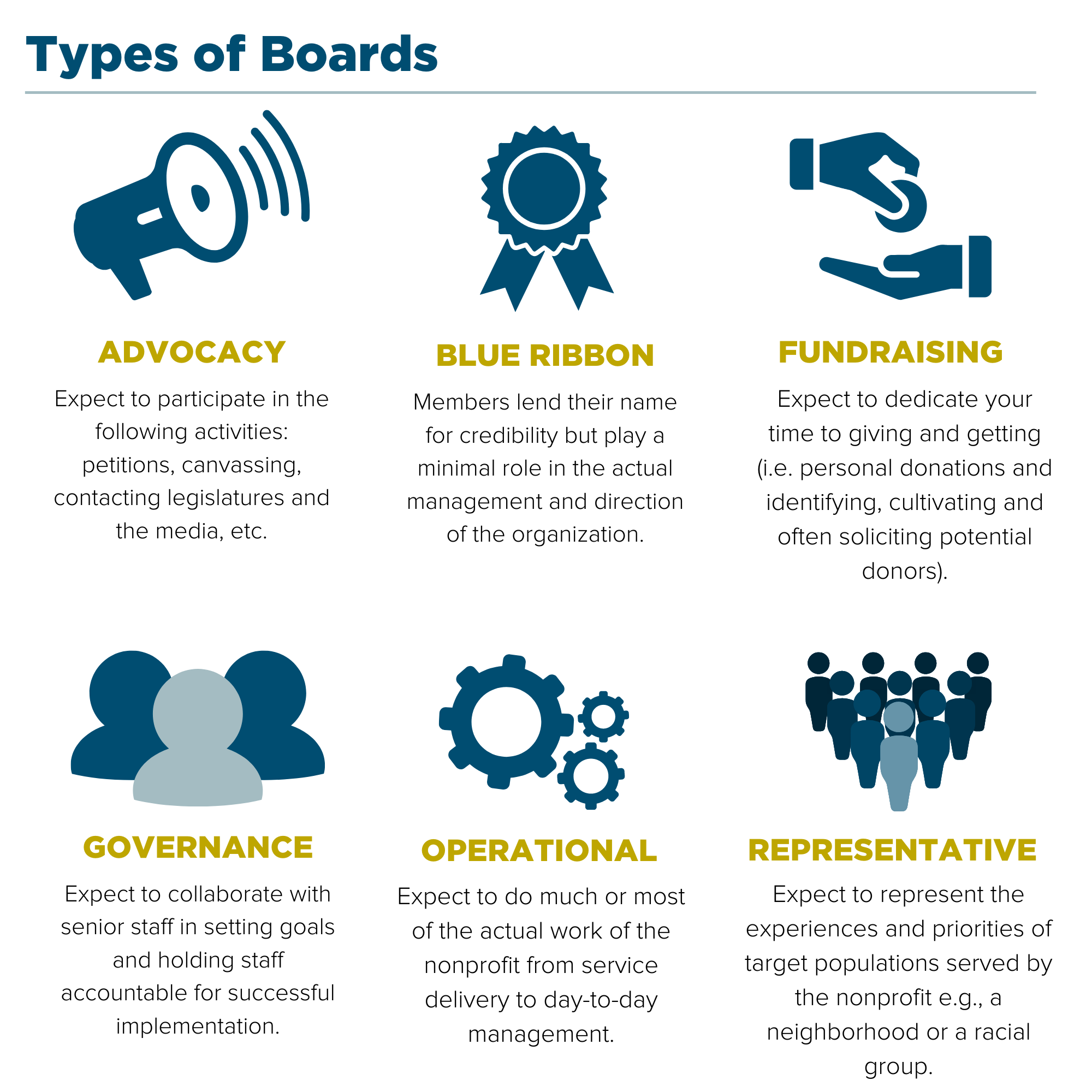There are many more nonprofit boards in the US than you might imagine—in fact, according to the National Center for Charitable Statistics, there are more than 1.5 million 501(c)(3) charities! With this abundance of volunteer opportunities—and a wide variety of organizational missions, sizes, and purposes—there is a lot to consider before deciding to join a board . Here, I outline some aspects to anticipate in the journey toward serving on a nonprofit board
5 Things to Consider When Deciding to Join a Nonprofit Board
1) Begin with mission – and personal experience.
What missions are you most passionate about? It may be health, education, the arts, or social justice, etc. Consider, too, whether you see joining a board as an opportunity to become more involved in your local community, or whether you would like to become part of an organization with a national or even global impact. It might be the case that there are opportunities within your existing network; perhaps you’re a grateful patient of a hospital or a close friend of yours is involved in a charity that’s looking for members. And if you have no idea where to begin, Board Source can serve as a helpful resource.
2) A personal connection to the mission is necessary but not sufficient. Think board culture.
It is not uncommon for board members to love the organization’s mission but not love their board experience. The reason is often board culture.
Board culture refers to the written and unwritten rules of behavior, communication, accountability, and decision-making. It’s what defines a board member’s experience and the impact on the organization’s mission and work. Therefore, joining a board whose culture aligns with your personal preferences can dramatically increase the probability of having a rewarding experience.
Here are the most likely types of board cultures you might encounter:

Keep in mind: these are not mutually exclusive categories. For example, higher education boards are primarily governing boards, but they are fundraising boards, too.
Understanding a board’s culture may be as straightforward as attending a few meetings as an observer.
3) You need to believe in the organization’s leadership and future.
So, you have found an organization whose mission and board culture aligns with your own interests and preferences – great! But do you know enough to believe in the organization’s leadership and ability to achieve sustained success? Do you respect and trust the CEO/Executive Director’s vision for the organization, the environment they create for employees, and the values with which they lead? As close partners to the CEO/Executive Director, it’s critical that board members find themselves in sync with the organization’s leader. And because becoming a board member is typically a multi-year commitment, you have to ensure you understand and share the vision for the organization 1-5 years from now.
4) Anticipate that your timeline might not perfectly match your ideal nonprofit’s.
Each board has its own recruitment processes and timetable, which is independent of when you want to consider joining. The process is usually facilitated via a formal nominating committee and annual cycle. So, while you can certainly reach out to an organization to express interest, be prepared to have to wait for a spot to open up… or respond quickly upon request!
5) Aim for at least two deal makers – and zero deal breakers!
Like most other important decisions, much of the information you will gather to help you decide whether to join a board is incomplete and changing. In this context, I find it is helpful to make sure you identify at least two positive indicators for moving forward—“deal makers”—which should be somewhat independent of one another. For example, one deal maker may be your best friend asked you to join them on the board and has been very positive about their experience That could be a deal maker, but what happens if your friend ends up leaving the board partway through your term? You need to have a second deal maker, such as becoming a board member would provide you with the opportunity to acquire a valuable new skill.
While I recommend having at least two deal makers, you only need 1 negative indicator—a deal breaker—to eliminate the board from consideration. Examples of deal breakers might be expectations for charitable contributions are way beyond your personal capability or there may be a conflict of interest with your employer. While these deal makers and deal breakers are clearly subjective, they can serve as a helpful tool in clarifying the pros and cons of each opportunity.
• • •
Now that you have taken the time to consider your own expectations and preferences, you are ready to begin speaking with boards! Here are some questions you may want to ask during those exploratory conversations:
10 Questions to Ask the Nominating Committee
- Are there term limits? If so, how long is the term? Do most members complete their terms?
- How does the current board represent a diversity of backgrounds, experiences, and skillsets? What value might I be adding?
- What new skills or valuable learning experience might I acquire?
- Are there expectations for annual financial contributions? If so, how much?
- How frequently does the Board meet? What is the expected participation at board meetings, events, programs, etc.?
- Are Board members also required to serve on subcommittees of the Board?
- What is the board’s ethics policy?
- When would my term begin? In the first 90 days, what do you expect from me and what should I expect from you?
- What is the timeframe for your current strategic plan, and how does the plan impact the role of the board members and their responsibilities in the coming years? What are the most important opportunities and challenges for the board in the next year?
- Could I observe one or two board meetings before becoming a fulltime member?
• • •
Joining a board provides a valuable opportunity to make a difference, enhance your skillset, and expand your network – while strengthening the nonprofit’s impact and future. By approaching your decision in a thoughtful and open-minded manner, you will be more likely to find the right match for everyone involved.




